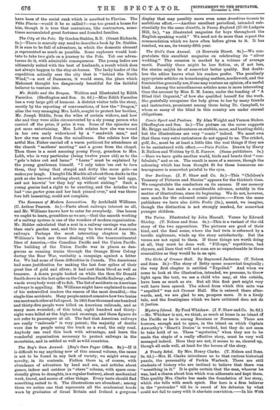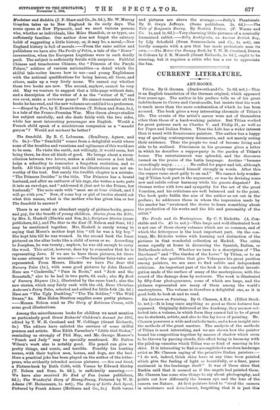A Trusty Rebel. By Mrs. Henry Clarke. (T. Nelson and
Sons. 3s. 6d.)—Mrs. H. Clarke introduces us to that curious historical puzzle, the personality of Perkin Warbeck. There are still students of history who are inclined to believe that there was "something in it." It is quite certain that the man, whoever he was, had a charm about him which won adherents and kept them. This quality Mrs. Clarke has made the foundation of her story, which she tells with much spirit. Her hero is a firm believer in the "pretender" till be is cured of his delusion by what could not fail to carry with it absalute conviction.—In his With
scene opens at New Plymouth, and we meet various persons who, whether as individuals, like Miles Standish, or as types, are sufficiently familiar. Our author does not forget the salutary
habit of suggesting a little history, or, it may be, a moral,—New England history is full of morals.—From the same author and publishers we have also The Perils of Pekin, a tale of the " Boxer " insurrection, when the European Legations were in such deadly peril. The subject is sufficiently fertile with surprises. Faithful Chinese and treacherous Chinese, the "Princess of the Purple Palace," soldiers of various nationalities—a detail which the skilful tale-writer knows how to use—and young Englishmen with the national qualifications for being heroes, all these, and others, make up a very lively scene. We cannot say whether these two books are new. The second, anyhow, cannot be very old. May we venture to suggest that a title-page without date, and a description of the writer of A as the "writer of B," and vice versa, make a reviewer pause ? He cannot remember all the books he has read, and the new volumes are entitled to a preference.
Ringed by Fire, by E. Everett-Green (T. Nelson and Sons, 5s.), is a tale of the Franco-Prussian War. Miss Green always studies her subject carefully, and she deals fairly with the two sides, while her most interesting personages are English. Would a French child speak of a mischievous companion as a " ntaudit garcon"? Would not mechant be better ?



























































 Previous page
Previous page